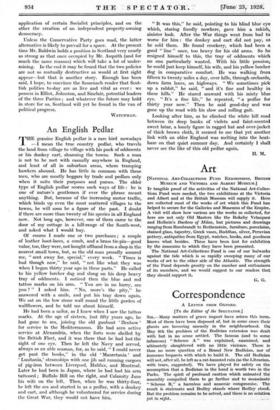An English Pedlar T HE genuine English pedlar is a rare
bird nowadays —I mean the true country pedlar, who travels the land from village to village with his pack of oddments or his donkey cart, shunning the towns. Such a man is not to be met with casually anywhere in England, and least of all in suburban areas, where tramping hawkers abound. He has little in common with these men, who are mostly beggars by trade and pedlars only when it suits their purposes and purses. The oldei type of English pedlar scorns such ways of life : he is one of nature's gentlemen if ever the phrase meant anything. But, because of the increasing motor traffic, which binds up even the most scattered villages to. the towns, he will soon be a figure of the past. I doubt if there are more than twenty of his species in all England now. Not long ago, however, one of them came to the door of my cottage in a hill-range of the South-west, and asked what I would buy.
Of course I made one or two purchases ; a couple of leather boot-laces, a comb, and a brass tie-pin—good value, too, they were, not bought offhand from a shop in the nearest small town, but, as the old man proudly assured me, " sent away for, special," every week. " Times is bad though now," he said, " not like what they was when I began thirty year ago in these parts." He called to his Yellow Iureher dilg and slung on his deep heavy tray of oddments. I noticed then the blue and red tattoo marks on his arm. " You are in no hurry, are You ? " I asked him. " No, more's the pity," he answered with a smile, and put his tray down again. We sat on the low stone wall round the little garden of wallflowers, and he told me about himself.
He had been a sailor, as I knew when I saw the tattoo marks. At the age of sixteen, -just fifty years ago, he had gone to sea, joining the old gunboat Benbow ' for service in the Mediterranean. He had seen active service at Alexandria, when the forts were shelled by the British Fleet, and it was there that he had lost the sight of one eye. Then he left the Navy and served, always as an able seaman, for, as he said, " I could never get past the books," in the old ' Mauretania and Lusitania,' steamships with one jib sail running cargoes of pig-iron between Liverpool, Halifax, and Montreal. Later he had been in Japan, where he had had his arm tattooed ; Buffalo Bill on the right, and Calamity Jane his wife on the left. Then, when he was thirty-four, he left the sea and started in as a pedlar, with a donkey and cart, and although he volunteered for service during the Great War, they would not have him. " It was this," he said, pointing to his blind blue eye which, staring fixedly nowhere, gave hini a rakish; sinister look. After the War things went from bad to worse for him • the donkey and cart did not pay, so he sold them. He found crockery, which had been a good " line " once, too heavy for his old arms. So he resigned himself to this, the tray of oddments which no one particularly wanted. With his little pension; he could just keep himself, his wife, and his yellow lurcher dog in comparative comfort. He was walking from fifteen to twenty miles a day, over hills, through orchards, down farm lanes, on highways. " We sometimes pick up a rabbit," he said, " and it's fine and healthy in these hills." He stared seaward with his misty blue eye. " It's a fine life," he repeated, " a pedlar for thirty year now." Then he said good-day and was gone up the road with his slow and rolling gait. - Looking after him, as he climbed the white hill road between 'its deep banks of violets and faint-scented sweet briar, a lonely figure in ragged hat and over-jacket of thick brown cloth, it seemed to me that yet another link with an older England was melting into the heat- haze on that quiet summer day. And certainly I shall never see the like of this old pedlar again.
H.M.






























 Previous page
Previous page